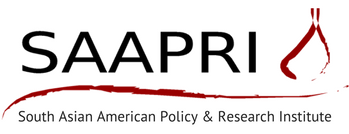

The Access to Justice Initiative and specifically the Against Hate Initiative targets the pervasive anti-Asian sentiment that has been amplified by the COVID-19 pandemic and does so through conducting local and statewide research and through coalition-building between Black and Brown communities against hate crimes. The initiative follows the increase in attention to anti-Asian hate recognized in the COVID-19 Hate Crimes Bill, passed by the U.S. Senate in April 2021. The constant harassment, abuse of and attacks on Asian Americans, including the March 16, 2021 murders of six Asian women in Atlanta, are but recent examples of xenophobia, misogyny, and discrimination that Asian American people face. For the South Asian American community in particular, this violence often comes in the form of religious bigotry, ethnic conflation, and ethnic erasure.
Since its founding, SAAPRI has been deeply involved in combating hate crimes, and we plan to continue this work as a central part of our organization’s mission to advance policy in response to the South Asian American and broader community’s needs. Our past work includes developing anti-hate resolutions in the Illinois House and Chicago City Council as well as successfully advocating to the FBI to track hate crimes against Hindus, Sikhs, and Arabs in addition to the already existing categories of Christians, Jews, Muslims, and Atheists. With work that began to combat the pervasive wave of discrimination and xenophobia directed at Muslims, Sikhs, and Hindus after the devastating attacks of 9/11, SAAPRI has long led projects to combat anti-South Asian American discrimination and violence.
In light of recent attacks against Asian Americans, we noticed there is very little if any data on bias-motivated crimes against South Asian Americans following the pandemic. The sensitive and private nature of hate crimes coupled with a complicated system rife with language barriers in documenting and reporting those crimes leads to an underreporting of violent and nonviolent crimes. Between 2012 and 2020, there were only 18 incidents reported in Chicago that were categorized as hate crimes. Given the size of the Asian American population in the Midwest and the range of behaviors that count as hate crime, SAAPRI’s own research has shown this number to be misleading and wants to continue research efforts to collect, analyze, and report more accurate data.
In addition, SAAPRI continues to have a seat at the table to advocate for data-driven solutions. SAAPRI board member Anita Banerji serves on the State of Illinois’ Discrimination and Hate Crimes Commission and SAAPRI Executive Director, Shobhana J Verma serves on the City of Chicago’s Commission on Human Relations’ Committee on Asian and Pacific Islander Hate Crimes. On these commissions, SAAPRI team members will be working with other government and community leaders to study and make recommendations to address the issue of hate crime against the whole Asian American Pacific Islander community and the South Asian American community in particular as part of SAAPRI’s Against Hate Initiative.
While SAAPRI continues to seek resources to be able to collect and provide the data, analysis, and community expertise necessary to improve the health, safety, and dignity of the South Asian American community, most recently, SAAPRI has partnered with The Asian American Foundation (TAAF) grantee Chinese American Service League (CASL) Chicago and the other Anti-Hate Action Centers in New York City and Oakland to work towards building a collaborative, comprehensive model that focuses on prevention, protection, response, and tracking of hate crimes. Part of this process includes focusing on what is needed to create and strengthen a coordinated local response to hate crimes.
SAAPRI is also working within its interethnic, interracial, and and interfaith network to identify and combat hate in our communities. Working with past and new community leaders and partners, we are using our position as a trusted community organization to educate our communities and advocate for sustainable local policy.
2024 Update: In culmination of three years of research, SAAPRI is releasing a report this month which analyzes hate crimes and discrimination against South Asians, focusing on Chicago, by evaluating 416 survey responses and examining historical and current hate crime trends. The report explores reasons for underreporting and offers recommendations to improve hate crime reporting practices. It also highlights the diversity within the South Asian community and the challenges in accurately representing this population in data collection efforts.
The driving force behind SAAPRI’s Access to Justice Project is to make sure that anti-Asian hate prevention and interventions are not determined by news cycles. Creating concrete policy recommendations for institutions and providing guidance materials that the public can use show the possibility of improving daily life.
Jordan Stalker, Research and Program Development Advisor
- Read about SAAPRI’s Against Hate project in the India post here
